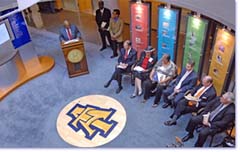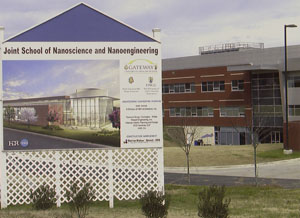 NC A&T is
"well known in areas such as advanced materials,
nanotechnology,
computational science, and
NC A&T is
"well known in areas such as advanced materials,
nanotechnology,
computational science, and |
    |
|
engineering," says N.
Radhakrishnan, former for research and economic development at
N.C. A&T. The school also has significant strengths in other
areas, including biotechnology, energy and the environment,
information sciences and technology, logistics and
transportation development. All these endeavors are aligned
in eight research clusters that bring faculty together across
disciplines to develop large research projects.
These research clusters run in parallel with a number of
multidisciplinary centers and institutes at N.C. A&T, which
develop partnerships with private and corporate sponsors,
educational institutions, and government agencies. This includes
two US Army Centers of Excellence that are working on projects
to enhance the capabilities of soldiers on the battlefield. [3]
|
|
NC
Agricultural & Technical State University Nanoscience
Research Centers |
- Center for Advanced
Materials and Smart Structures
- Center for Nanoscale
Chemical-Electrical-Mechanical Manufacturing Systems
- Engineering Research
Center for Revolutionalizing Metallic Biomaterials
- Center for Nanoscience
and Nanomaterials
- Transitioning
Undergraduate Research to the Undergraduate
Classroom
|
|
UNC Greensboro Nanoscience Research Centers |
- Center of Research
Excellence in Nanobiosciences
|
|
Source:
North Carolina Board of Science and Technology |
|
 NC A&T’s
engineering and technology prowess hasn't gone unnoticed on the
national level. In 2006 in the category of Doctorial Granting
Universities NC A&T was rated as a High Research University in
the Carnegie Foundation classification of colleges and
universities. In 2008 NC A&T received an 18 Million dollar
grant for an Engineering Research Center (ECR) - N.C. A&T
Awarded NSF Engineering Research Center foundation. The award to
A&T marked the first time that an HBCU has been the lead
institution of an ERC.
NC A&T the
largest producers of minority engineers in the country and only
PhD HMI in North Carolina, offers approved master's degrees in
Civil Engineering, Chemistry, Biology, Industrial Systems &
Systems Engineering, Electrical Engineering, Mechanical
Engineering, Computer Science, Chemical Engineering, Physics,
Computational Science and Engineering, as well as doctoral
degrees in Energy and Environmental Systems Engineering,
computational Science and Engineering, Electrical
Engineering, Mechanical Engineering, and Industrial and Systems
Engineering.
Aggie Pride NC A&T’s
engineering and technology prowess hasn't gone unnoticed on the
national level. In 2006 in the category of Doctorial Granting
Universities NC A&T was rated as a High Research University in
the Carnegie Foundation classification of colleges and
universities. In 2008 NC A&T received an 18 Million dollar
grant for an Engineering Research Center (ECR) - N.C. A&T
Awarded NSF Engineering Research Center foundation. The award to
A&T marked the first time that an HBCU has been the lead
institution of an ERC.
NC A&T the
largest producers of minority engineers in the country and only
PhD HMI in North Carolina, offers approved master's degrees in
Civil Engineering, Chemistry, Biology, Industrial Systems &
Systems Engineering, Electrical Engineering, Mechanical
Engineering, Computer Science, Chemical Engineering, Physics,
Computational Science and Engineering, as well as doctoral
degrees in Energy and Environmental Systems Engineering,
computational Science and Engineering, Electrical
Engineering, Mechanical Engineering, and Industrial and Systems
Engineering.
Aggie Pride |
|
Expertise in
nanotechnology may become a prerequisite for many
scientists and engineers that support a wide variety of
industries, nano expertise among the North Carolina
science and engineering workforce may soon become a
competitive advantage issue for the state."
And " almost all of the occupations
which will be affected by nanotechnology will require a BS in
engineering with a broad, interdisciplinary and
multi-disciplinary approach; require an understanding not only
of electrical, mechanical
and
civil engineering, but biology, physics and chemistry as well."
[5] |
|
|
|
Staying a step ahead
stated North Carolina A&T State
University is well positioned to grow programs in some of the areas
identified as emerging industries, citing Objective 2.2: Increase access
to University intellectual property and resources (faculty, students,
research. Create market-oriented university research clusters to better
communicate research programs. [3] |
|
Identified Emerging Markets [4] |
[5][
reference: examples of research clusters created by NC A&T are the
following: |
-
Advanced Manufacturing
-
Advanced Materials, including Chemicals, Plastics and Nanotechnology
-
Biotechnology and Pharmacology
-
Computing, Software and the Internet
-
Design and Arts
-
Logistics and Distribution
|
-
Public Health
-
Biotechnology, Bio & Food Sciences
-
Advanced Materials & Nanotechnology
-
Computational Science & Engineering
-
Leadership & Community Development
-
Information Sciences & Technology
-
Transportation & Logistics
-
Energy & Environment]
|
|
|
|
In HB 1264(7) the
Legislature mandated the Board of Governors emphasized
existing and new programs at Liberal Arts Universities
specifically aimed at meeting business, industry, workforce, and
career needs of North Carolina in the State's changing and
growing knowledge-based economy, taking into account, as
appropriate, State and regional economic strategies. With the
source of enrollment growth being minorities as white enrollment
leveled off across the University of North Carolina, Guilford
Technical Community College experiencing record enrollment, ECPI
University and ITT Tech offering addition technology based
education in the Triad education market place. What’s left
on the plate for HWI Liberal Arts UNCG with a potential
national and regional prominent HBI NCA&T across town? Would
political astute business organization affiliated with
university use political connections to reposition HWI UNCG in
and HBI NCA&T out? UNCG 2003-08 formulated a 2003-08
academic plan to establish a joint Millennial campus with NC
A&T.
|
| |
|
Scripting HBI NC A&T Out and HWI
UNCG Gateway Research Park In |
|


 “The
world is seeing explosive growth today in the commercialization
of nanotechnology. We will have all of the assets right here
in Guilford County that we need to participate in that
explosion, and they will be right here at the Gateway
University Research Park." said Erskine Bowles, president of
the University of North Carolina system .
[1]
“The
world is seeing explosive growth today in the commercialization
of nanotechnology. We will have all of the assets right here
in Guilford County that we need to participate in that
explosion, and they will be right here at the Gateway
University Research Park." said Erskine Bowles, president of
the University of North Carolina system .
[1] 








